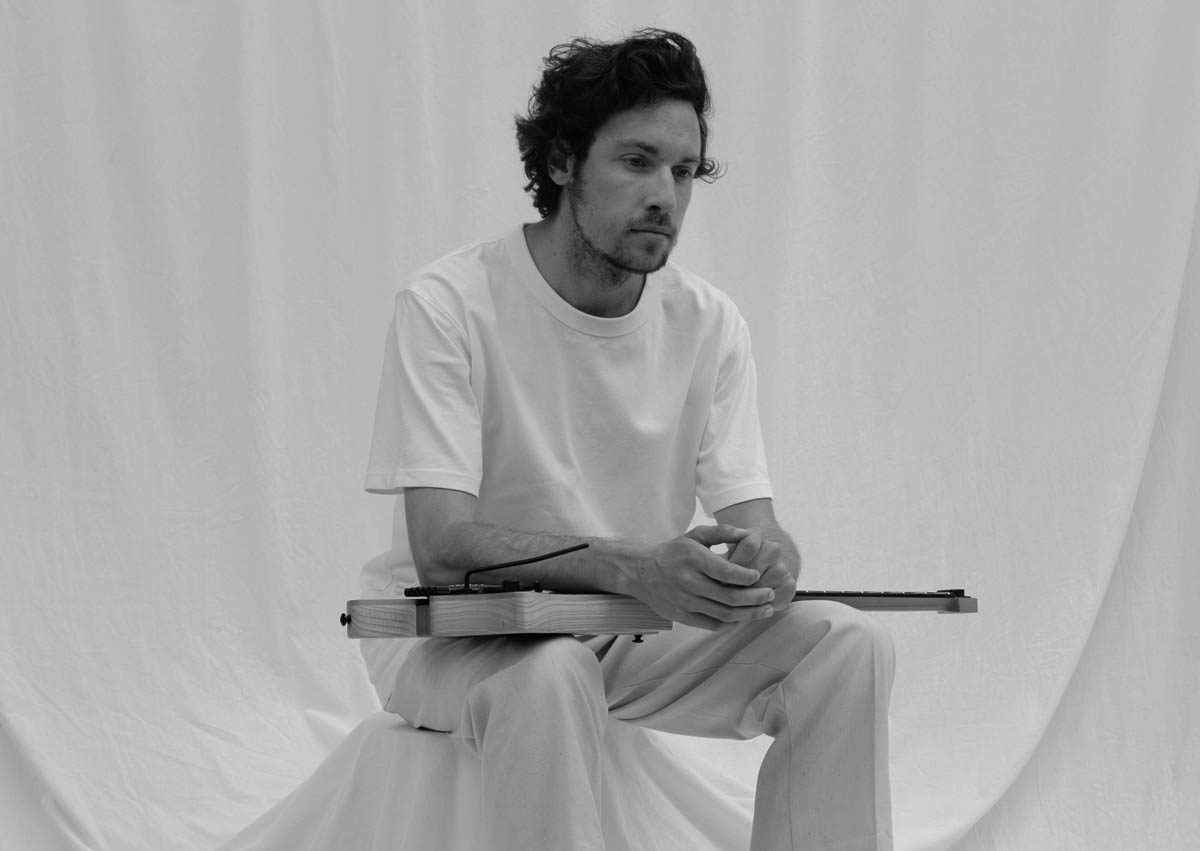
Only 10 years after he started posting bits of music online and hoping that somebody – anybody – would give him a click, Australian guitarist Plini is now experiencing the kind of success he never dreamed possible.
As both a support act and a headliner, he’s trekked across the globe several times (he was the first instrumental artist to play the U.K.’s Download Festival), and on the strength of his dazzling 2017 debut album, Handmade Cities, he’s been hailed by the likes of Steve Vai as “the future of exceptional guitar playing.”
Guitar World readers were similarly bowled over, ranking the disc number five in a poll of the 20 best guitar records of the decade.
If anybody needs further convincing that the prog-guitar wunderkind had indeed arrived, it came last fall when hip-hop star Doja Cat re-imagined her hit song Say So at the MTV Europe Music Awards by utilizing bits of Plini’s song Handmade Cities – without the guitarist’s knowledge or permission.
Initially, Plini issued a statement, calling the lift “disappointing but not particularly surprising in a sector of the industry that is usually more interested in clout than creativity.” Given a bit of time and space, the guitarist now calls the incident “surreal.”
“It’s probably one of the most surreal turns of events of my career so far,” he says. “I think it’s hilarious and amazing, mostly because I wrote that song in my bedroom at the end of 2016, and it’s made its way to L.A. and inspired someone who thought, ‘Oh, it would sound cool if I put this in this song.’ If you ran some random probability generator, this would be something you would never think could happen.”
Plini’s newfound fame is bound to spread further with the release of his second full-length album, Impulse Voices. Throughout eight dizzying tracks, Plini takes listeners on something of a metaphysical mood journey.
Get The Pick Newsletter
All the latest guitar news, interviews, lessons, reviews, deals and more, direct to your inbox!
Whenever I record a guitar solo, I always think that if I’m going to use a certain trick or technique, I should do it once so that it’s shiny and exciting
Performing alongside the guitarist are his longtime cohorts, bassist Chris Grove (who also co-produced and mixed the album) and drummer Chris Allison, as well as contributions from Dave Mackay on piano and synthesizer, John Waugh on saxophone and Amy Turk on electro-acoustic harp.
While there’s plenty of breathtaking moments of wild and woolly guitar virtuosity (“Papelillo’’ includes thrilling flights of djent fretboard wizardry, The Glass Bead Game features soaring jazz-fusion runs, while the title track is a speed-picking marvel), the album succeeds more in terms of the emotions Plini evokes through artfully crafted soundscapes and adventurous, genre-bending arrangements than in rote shredding.
“I play the bare minimum amount of guitar that I can while also being a guitarist,” he explains. “I love playing guitar, and I love to do things I’ve never done before on the instrument. Sure, I have my little guitar-hero ego that lives inside me and is like, ‘Hey man, you should throw a sweep-picking lick here and let people know that you know how to do it.’ But I think the biggest thing for me is just trying to write music that I think is interesting, and once I’ve done that, I find the room to put guitar on it, and that’s the blend it becomes.”
Before releasing your debut album, you gained attention by putting out music on social media and YouTube. Do you think your career would’ve been possible without such platforms?
“Probably not. I wonder if I would have had the energy to write music, assemble a band and network enough in the hope that someone from a label would come to a show and think it was good enough to want to sign me.
“That’s the traditional route, and I don’t know if I would have been driven enough to pursue it. It’s a total accident that I got to make music for fun and put it on the internet, and then the internet took care of the rest. Without YouTube and Bandcamp, I’d be a hobby musician.“

Some guitarists start to tune out other artists for fear of being influenced too much. They think it impedes their originality. Where do you stand on that?
“I constantly listen to music, and I think one of my biggest influences is simply the amount of different music I listen to. I don’t even know where it’s coming from, but I’ll hear some sound and eventually try and use it in a song.
“I listen to a lot of necessarily great electronic music, Top 100 electronic stuff, because I know nothing about how it’s produced. I’m always trying to figure it out. That stuff isn’t really related to guitar, though. I’m listening to more and more different jazz guitar stuff, along with bands I grew up on – Meshuggah and Dream Theater.“
If you’re getting trapped talking about whether you need more technique or less technique for it to sound good, that’s going to hold you back from making good music
It feels like you’re spreading the waters of progressive rock. Is there anything that bothers you about the genre? Who’s getting it right, and who isn’t?
“I don’t know if anybody’s getting it 'wrong' per se, but some people do tend to get stuck on an idea of how progressive rock should sound. The very term 'progressive' implies that you’re trying new things, new sounds, but if the music doesn’t sound like what people grew up on, they don’t like it. On the other hand, a lot of people want the music to sound vastly different to what they know, so there’s a bit of a divide going on.
I think some people believe that it can’t be progressive if it doesn’t sound difficult or hard to play.
“Yeah, sure. An attitude like that keeps people from being creative. If you’re getting trapped talking about whether you need more technique or less technique for it to sound good, that’s going to hold you back from making good music.
“Some bands worry too much that they need to include certain elements in order to stay relevant or fit in, when that might actually be doing them a disservice. You just can’t worry about such things.“
Has the forced time at home during COVID given you an opportunity to practice more than you normally would?
“Absolutely. After finishing the album, I didn’t play guitar too much, but I’ve just started getting back into it during the last couple of weeks, trying to figure out some new things and just trying to get better in every way. I’m also working on different production ideas, so when inspiration strikes I can tackle the idea of a new sound.“
Because of COVID, some of the players on the new album had to record remotely.
“That’s right. I recorded all the guitars and most of the other instruments at home. Simon Grove played bass and mixed the record from home as well. With my drummer, Chris Allison, we demoed drum ideas by email.
“We were going to do the drums at one studio, but travel got shut down, so we had to book a different studio closer to home. We took a week there and did the drums. As far as the other stuff, the record was mostly remote.“
It must be hard to direct people’s performances remotely.
“That could be a problem, but fortunately Simon has played bass with me for every show I’ve done, and I’ve done probably 100 shows with Chris, so we have a strong level of communication.
“They’re really good friends, which makes it easy for me to tell them when something sucks, or for them to tell me when something sucks. [Laughs] With people that I don’t know so well, there is something missing when recording remotely, but you just get through it.“
I always think that if I’m going to use a certain trick or technique, I should do it once so that it’s shiny and exciting. You want it to stand out
Let’s talk about some of the songs. On I’ll Tell You Someday, you don’t seem to repeat a phrase or a trick, but it doesn’t sound like mindless improvisation. You’re telling a story.
“I think that song is the most guitar solo-ish sort of song on the record. Whenever I record a guitar solo, I always think that if I’m going to use a certain trick or technique, I should do it once so that it’s shiny and exciting. I carry that approach through all the songs. If I’m going to do something that’s flashy, I’ll try to only do it once. You want it to stand out.
What are you using on Papelillo to get those gorgeous sustained notes?
“That is a lot of compression going into a drive pedal. I’m also using digital plugins – the same sort of concept. It’s just really, really saturated.“

On the title track, you do some marvelous staccato picking, but it’s not your average showboat kind of thing.
“That’s the clean stuff. I’m just picking really hard on a single-coil neck pickup. Hopefully, those parts sound like someone who’s really good on the guitar just picked it up and started playing.
“In truth, that was me sitting there trying 12 different picks to see which shape and thickness got the best attack. The problem I’ve had with recording clean staccato clean guitar is that I can get too much pick attack — all you hear is the overtone of picking than the sound of the actual note. There’s a lot of trial and error.“
The delay on the main riff of Ona is as much a part of the song as the note pattern itself. I take it you came up with that riff pattern hearing that delay, right?
“Yeah, totally. That’s a plugin with the delay setting set to 'maximum beautiful.' I don’t think I would have been able to come up with that melody hearing a dry tone. It would have been too simple, but the delay made it sound really cool and I turned it into a song. That’s one of the best things about all the digital technology. I’ll be home with my headphones on, and I’ll sound like I’m in a really expensive studio.“
You play six-, seven- and eight-string guitars. Can you pick each one up and feel immediately comfortable?
“Definitely not. Honestly, I’m a six-string player. I’m getting more comfortable playing seven strings, but when I get on an eight-string, all I know is the lowest string; I always forget there is any more to it. When I record, I do it almost entirely on a six-string, unless I happened to write something on a seven-string. The eight-string’s really there for the range, but I’m hoping to get more comfortable using it.“
The shape of your signature Strandberg guitar is interesting. Was it designed more for sitting or standing?
“The guitar is based pretty heavily on the Boden production model that Strandberg makes. It took years before it went into production, so I think it was designed for seated and standing positions. The signature model I have is just the production model, but it was tweaked aesthetically in terms of the finishes, the pickups and the switching.
If you pick up a guitar with a headstock, does it feel strange?
“It does feel a little bit strange. I end up hitting people with the headstock if I turn around too quickly. [Laughs]“
- Plini's Impulse Voices is out now.
Joe is a freelance journalist who has, over the past few decades, interviewed hundreds of guitarists for Guitar World, Guitar Player, MusicRadar and Classic Rock. He is also a former editor of Guitar World, contributing writer for Guitar Aficionado and VP of A&R for Island Records. He’s an enthusiastic guitarist, but he’s nowhere near the likes of the people he interviews. Surprisingly, his skills are more suited to the drums. If you need a drummer for your Beatles tribute band, look him up.
“It holds its own purely as a playable guitar. It’s really cool for the traveling musician – you can bring it on a flight and it fits beneath the seat”: Why Steve Stevens put his name to a foldable guitar
“Finely tuned instruments with effortless playability and one of the best vibratos there is”: PRS Standard 24 Satin and S2 Standard 24 Satin review










